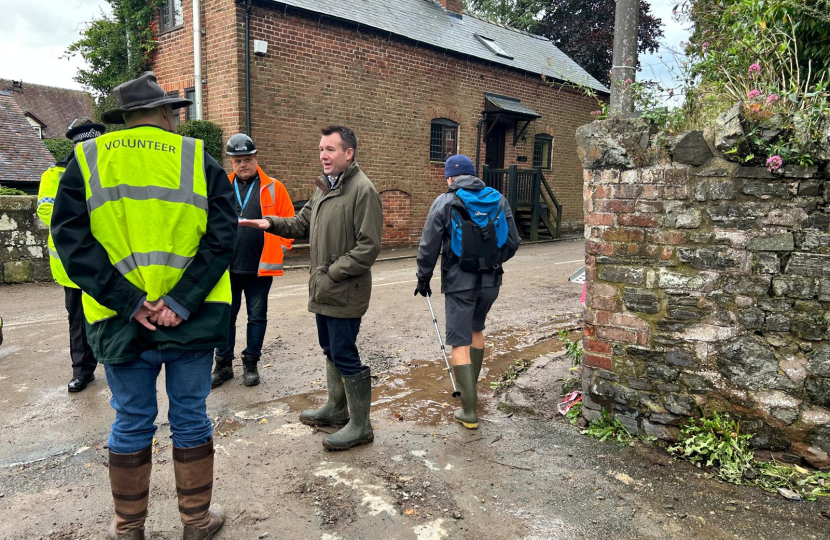
Government support requested by Stuart Anderson MP following flash flooding in South Shropshire
Stuart Anderson MP has said that government support must be "urgently activated" for those who have been affected by recent flooding. It follows his visit to All Stretton on Friday 27th September, which has been greatly impacted. Flooding of buildings, roads, and farms are affecting areas such as Bishops Castle, Church Stretton, Knighton, and Ludlow. Stuart praised the work of local groups and services like the Council and Shropshire Fire and Rescue.
Earlier in the week, a new package of support to build flood resilience in rural areas was set out. But it was not accompanied by any funding commitments from the central government. Meanwhile, concerns have been raised that up to £50 million support is being held back by the government, after a farming recovery scheme was extended before the general election. With parts of the UK having seen a month's rainfall in a single day on Monday 23rd September, Stuart has said that the government must take urgent action to deliver funding that will help rural communities and farms quickly recover.
The flood resilience plan, published on 23rd September, includes a new partnership to foster better collaboration between key partners and deliver evidenced solutions. Partners will gather information on the rural impact of flooding, with a survey of farmers and landowners to be undertaken to better understand their experiences. It forms part of the Flood and Coastal Erosion Risk Management Programme, as part of the which organisations delivering funding will be encouraged to include a rural portfolio - with a digital space provided for rural communities and local businesses to access information relevant to them.
While Stuart welcomed the renewed focus on rural communities included in the plan, he said that it must be met with funding commitments from central government. In August, Stuart called on the new government to reform the flooding recovery framework. This is because it currently excludes local authorities where flooding occurs across several boundaries as part of a river system or catchment area. In areas where the threshold of 50 properties required for the activation of support has not been met, local authorities are often left to front the costs of recovery efforts themselves.
Stuart also urged the government to retain the commitment to provide £50 million in farm recovery funding, which the previous government had pledged before the general election. The Farming Recovery Fund was established to provide farmers support to recover from uninsurable damage, with grants of between £500 and £25,000 to return their land to the condition it was before the exceptional flooding occurred. It helped 679 farmers with £2.19 million allocated. In May, the Fund was significantly expanded, with £50 million to cover a wider area of farmers who have suffered river flooding. The National Farmers' Union (NFU) said it is still awaiting details of how the Fund can help businesses to recovery from flooding.
Stuart Anderson MP said:
"Recent years have sadly seen increased flooding, resulting in significant costs for many residents across South Shropshire. September's flash flooding has greatly affected villages such as All Stretton, where I have seen its impact first-hand and fully support recovery efforts. Following my visit, I have called on the government to drive down flood risk from every angle and take urgent action to help those impacted. The last government expanded the Flooding Recovery Fund to £50 million, covering all farms across the country. Yet, much of this funding has not reached those eligible for it. So, I have called on the new government to ensure that this funding is quickly released."
Stuart added:
"I have also reiterated my call for the Flooding Recovery Fund to be reformed. This is because it currently excludes local authorities where flooding occurs across several boundaries as part of a river system or catchment area. In areas where the threshold of 50 properties required for activation of support is not met, local authorities are often left to front the costs of recovery efforts themselves. By reforming the framework, we can make support easier and fairer to access."






